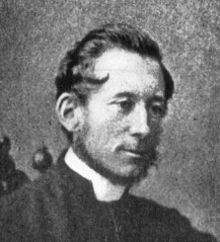John Bacchus Dykes
| The Rev. Dr. John Bacchus Dykes | |
|---|---|
 |
|
| Born |
10 March 1823 Kingston upon Hull, Yorkshire |
| Died | 22 January 1876 (aged 52) Ticehurst, Sussex |
| Education | Katharine Hall (later St. Catharine's College), Cambridge |
| Occupation | Vicar of St. Oswald's, Durham |
| Spouse(s) | Susannah Thomlinson Kingston (m. 1850) |
| Parent(s) | William Hey Dikes (1792–1864) & Elizabeth Huntington (1792–1867) |
| Church | Church of England |
John Bacchus Dykes (born 'Dikes') (10 March 1823 – 22 January 1876) was an English clergyman and hymnist.
John Bacchus Dykes was born in Hull, England, the fifth child and third son of William Hey Dikes (sic), a ship builder, later banker, and Elizabeth, daughter of Bacchus Huntington, a Leeds surgeon, and granddaughter of the Rev. William Huntington, Vicar of Kirk Ella. His paternal grandparents were the Rev. Thomas Dikes LL.B and Mary, daughter of William Hey. He was also a cousin of the Rev. George Huntington. (J.T. Fowler, editor of the 1897 biography written by Dykes's sisters, Fanny and Lucy, explains how and why the original spelling of the family name – Dykes – came to be changed to Dikes and then back to Dykes. John Bacchus, his father and grandfather were all registered at birth as Dikes, with the grandfather only reverting to the 'y' variant by virtue of the plaque affixed, at his earlier insistence, to his coffin. John Bacchus matriculated as Dikes but graduated as Dykes. Contemporary documents treat the variant spellings carelessly: see, for instance, the biography of the Rev. Thomas Dikes. It should be remarked that Fowler's biography tends towards the hagiographical and is not entirely accurate. This has had adverse consequences for subsequent biographical sketches of Dykes, almost all of which have used Fowler as their primary source.) Dykes was a younger brother of the poet and hymnist Eliza Alderson, for at least four of whose hymns – And now, belovèd Lord, Thy Soul resigning; Infant of days; Jesus Christ, the glorious captain; and Lord of glory, who has brought us – he wrote the tunes (respectively COMMENDATIO; IN TERRA PAX; SOLDIERS OF THE CROSS; and CHARITAS).
By the age of 10, he was de facto assistant organist – there is no record of any formal appointment – at St John's Church in Myton, Hull, where his paternal grandfather (who had built the church) was vicar and his uncle (also Thomas) was organist. He also played the violin and the piano. Studying first at Kingston College, Hull and then at the West Riding Proprietary School at Wakefield, he matriculated, as the second 'Dikes Scholar' (the second beneficiary after his elder brother, Thomas, of an endowment established in 1840 in honour of his grandfather) at Katharine Hall (later St. Catharine's College, Cambridge). Here, as an extra-curricular subject, he studied music under Thomas Attwood Walmisley, whose madrigal society he joined. He also joined the Peterhouse Musical Society [later renamed the http://www.cums.org.uk/ Cambridge University Musical Society], becoming its forth President, immediately following his friend, the physicist William Thomson (later to become the 1st Baron Kelvin). Although we know, from his diaries and correspondence, from Fowler, and from reports in the Press, that a number of his part-songs were performed by the CUMS, these are currently lost. Graduating in 1847 as a Senior Optime, he was appointed to the curacy of Malton, North Yorkshire in 1847. Ordained Deacon at York Minster in January 1848, in the following year he was appointed a minor canon of Durham Cathedral (an appointment he held until his death), and shortly thereafter to the office of precentor. In 1862 he relinquished the precentorship (to the dismay of Sir Frederick A Gore Ouseley) on his appointment to the living of St. Oswald's, Durham, situated almost in the shadow of the Cathedral, where he remained until his death in 1876.
...
Wikipedia
